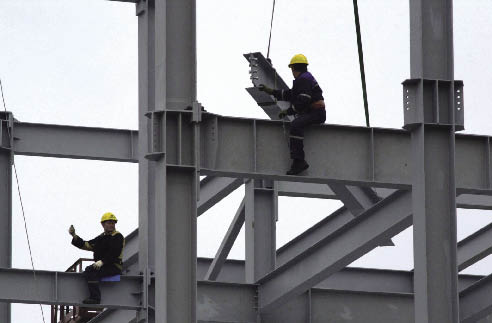| Western Countries Shift Their Attitude Towards
Chinese Investment
By staff reporter JIAO FENG
THE first China Overseas Investment Fair opened in Beijing on November 3, 2009, aiming to promote Chinese investment in overseas markets. Surprisingly for the host, representatives from developed countries that had previously been cautious toward Chinese investment were among those from the 100 plus participating countries. They were sincere and anxious to market their projects to Chinese investors. Does this signal a change in the Western attitude toward Chinese investment?
 |
|
The “Pearl of the Baltic Sea” business center under construction in Saint Petersburg is a Chinese investment by several Shanghai companies.
China Foto Press |
Fears Unfounded
Over the past 16 years, China has been the largest foreign direct investment recipient among the developing countries. By the end of 2008, a total of US $900 billion had flowed into China. In stark contrast to this wave, by the end of 2008 China’s investment in overseas markets had totaled only US $184 billion, representing a tiny proportion of the global Foreign Direct Investment (FDI) and ranking 22nd worldwide.
Due to different corporate backgrounds and cultural disparities, Chinese overseas investments were the cause of worry and fear in some countries, and consequently Chinese companies with acquisition offers were shunned on the basis of different excuses. For example, the China National Offshore Oil Corporation’s attempt to purchase American Unocal was rejected, likewise the Aluminum Corporation of China (Chinalco)’s merger and acquisition bid for Australian Rio Tinto was repelled. Australia’s national daily newspaper The Australian published an editorial titled “Say No to Chinalco,” saying that Chinese enterprise’s entry into the Australian market would threaten its national interests. However, according to statistics published on the website of the Australian Bureau of Statistics, foreign investment in Australia reached A$1,724.4 billion on December 31, 2008; the first three leading investor nations were Britain (25 percent), the United States (24 percent) and Japan (5 percent). In contrast, the investment from the Chinese mainland was only A$4.615 billion, making up only 0.27 percent.
“We’ve heard about the fears that the world may convert to an ‘Asia-Pacific era’,” commented Hon. Anura Priyadharshana Yapa, Minister of Business Development and Investment Promotion of Sri Lanka, “but for a country inside the Asia-Pacific economic sphere like Sri Lanka, we believe the progress of the Asia-Pacific region will be viewed as a positive stimulus to the global economy. China has increasingly played a leading role in this regard. We assume that such fears are groundless, because we believe China will always opt to create a win-win situation.”
Some representatives of Western countries clarified that individual cases could not represent the true attitude of Western countries toward Chinese capital. Jon Huntsman Jr., current U.S. ambassador to China, said at the fair that China is the U.S.’s fastest growing investor. Chinese direct investment in his country has reached billions of dollars, and Chinese enterprises are playing a very active role in many American industries, from telecommunications to consumer goods.
Jim Murphy, executive director of the Markets Group of the Australian Treasury, stated at the fair: “In 2008 our Foreign Investment Review Board (FIRB) released a set of guidelines related to the screening of foreign investment proposals. Those guidelines are non-discriminatory, intended to promote transparency, and are not to be considered new policy.The FIRB will review each proposal on a case-by-case basis, including any from China. The guidelines apply equally to all foreign investments. China is showing a great interest in investing in the Australian resources sector, which is conducive to the further development of the Chinese economy. Meanwhile, Australia is willing to supply their resources for benefits they deliver to the Australian economy. Therefore, the Australian government always welcomes Chinese and other foreign investment in our resources sector.”
|
